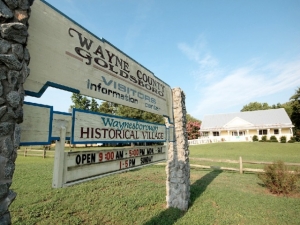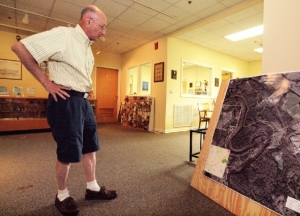Waynesborough Historical Village to pick up $6,000 more from city
By Ty Johnson
Published in News on July 25, 2011 1:46 PM

News-Argus/MICHAEL K. DAKOTA
The Old Waynesborough Commission received an additional $6,000 from the City Council through a budget amendment at the council's meeting last week, making the city's contribution to the agency $30,000 -- the full amount requested.

News-Argus/MICHAEL K. DAKOTA
Arnold Leder, a member of the Old Waynesborough Commission, looks over a map of the expanded historic village at the visitors' center early today. The park is located on the site of the original county seat. Local historians have been working for more than two decades to re-create a village that typifies the old settlement, which was abandoned in the mid-1800s.
Despite the loss of a major financial contributor, Waynesborough Historical Village will remain open seven days a week thanks to a $6,000 increase in funding from the city.
The City Council voted last Monday to increase its budgeted contribution to the Old Waynesborough Commission from $24,000 to $30,000, the full amount the organization requested.
The increased funding for the Waynesborough Commission and a $20,000 donation to WATCH won't impact the general fund, however.
The money for the Waynesborough Commission will come wholly from the city's occupancy tax fund, a tax collected from those using hotel rooms in the city limits. Interim City Manager Tasha Logan said the WATCH donation came out of a previous year's allocation to the organization that was encumbered by the city but not distributed. The funds rolled over and will be distributed when the council meets Aug. 1.
In previous years, the city had donated $30,000 to the Old Waynesborough Commis-sion, which last year took a $6,000 reduction in funding. The park adapted to the lack of funds by holding off on improvement projects. Bobby Rex Kornegay spoke May 16 on behalf of the commission, saying those improvements and renovations were now necessary to keep park visitors safe and that there were still no capital expenditure projects in its current budget.
Richard Slozak, a volunteer with the village and Goldsboro's former city manager, said Friday that after the loss of a donor the village's ability to retain its daily schedule was in danger, since operating expenses would need to be eased to allow for the renovations. The village is open Monday through Saturday from 9 a.m. to 5 p.m. and from 1 p.m. to 5 p.m. on Sundays.
With the additional help, the park will remain open every day.
Kornegay was one of six individuals who spoke on behalf of agencies during the public hearing on the budget to request additional funding for their organizations, though Waynesborough was the only agency to see a change in its allocation from the city's proposed budget which was presented to council May 2.
Although there were discussions during open meetings about funding for other agencies, Ms. Logan said Waynesborough's funds, along with the donation to WATCH, were deemed worthy of donations during "internal discussions of priorities."
During budget discussions in May, District 2 Councilman Bob Waller identified the local chapter of the American Red Cross as a group worthy of funding and District 4 Councilman the Rev. Charles Williams said he would like to see continued donations made to Project Uplift, the Boys and Girls Club, Communities in Schools and Rebuilding Broken Places. None of those agencies received funding through the budget that went into effect July 1, though Project Uplift and the Boys and Girls Club were identified as two agencies that could apply for Community Development Block Grant funding.
Ms. Logan and Finance Director Kaye Scott said that among the agencies receiving funding from the CDB grant were Rebuilding Broken Places, WISH, Eastpointe, Project Uplift, the Boys and Girls Club and the Goldsboro/Dillard alumni organization.
Ms. Logan described the council as "extremely sensitive" to each agency's cause, but pointed out that there were limits on finances.
"They have to set priorities of what they can fund," he said. "They didn't want to negatively impact the general fund."
